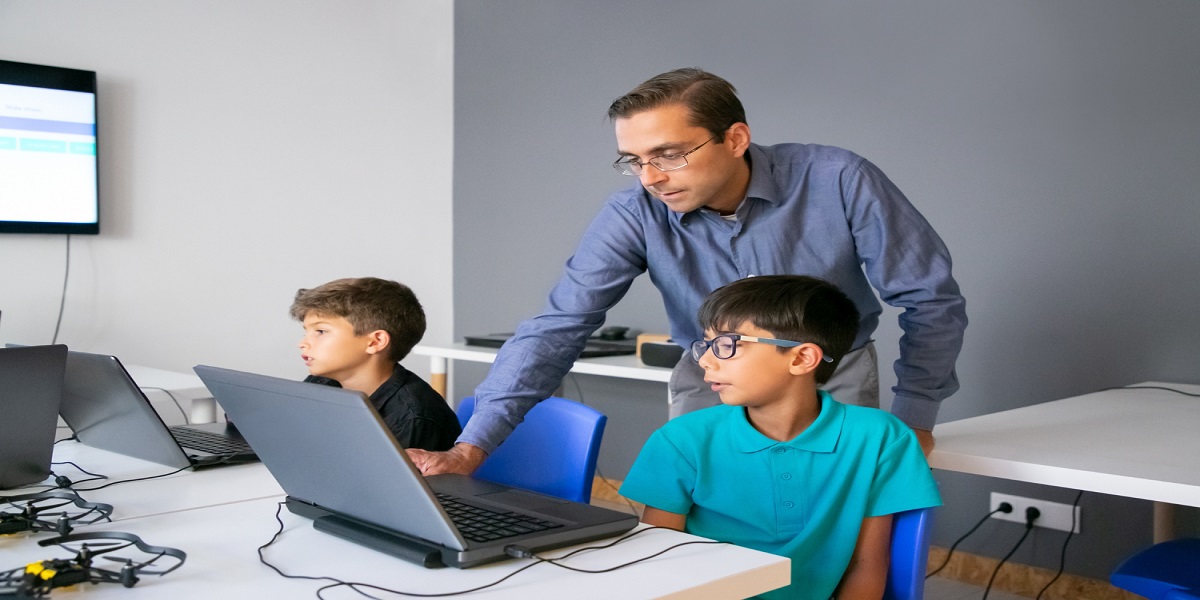
The Impact of Technology on Education and E-Learning Platforms
- By Chloe Clarke
- 07-02-2024
- Technology
Educational technology means using technologies to improve teaching and learning activities. It helps to teach students about technology and makes them ready for future careers. It involves using regular tools like computers and the internet to more advanced tools like artificial intelligence and virtual reality. The goal is to make the learning process better for students and teachers by making it more personalized, interesting, and easy to access. As per experts from CDR Writers Australia, the pervasive integration of technology in education has revolutionized learning, fostering interactive and personalized experiences that transcend traditional classroom boundaries.
Positive Impact of Technology
The positive impact of technology on education has made learning more easier. It offers personalized learning and fulfills each student's needs. Following the benefits of implementing technologies in education:
1. Enhanced Accessibility and Inclusivity
Technology has made education within reach of people who had difficulties before. People with physical disabilities, geographical restrictions, and other obstacles can have access to education through digital learning platforms. This inclusiveness ensures that all the learners can have equal access and the same chances to learn.
2. Interactive and Engaging Learning
Educational technologies create interactive and captivating learning that captures students' attention and improves their creativity. Multimedia elements like videos, game-based content, and simulations make it easy to remember the learning. It’s like having a fun adventure while you learn. Plus, It offers you quick feedback to make it easier to understand things.
3. Global Collaboration
Technology helps students to work together on projects even if they are far away from each other. They will get a chance to learn from each other, share ideas and develop important skills like problem-solving and communication. By using online platforms, students can make friends around the world and prepare them for an interconnected world.
4. Access to Rich Educational Resources
The internet has a vast amount of information that provides students and teachers access to a wealth of educational resources. There are online libraries, digital textbooks, open educational resources and complete information on many subjects. These resources will help students more than regular textbooks do and understand the topics they are studying.
5. Higher Engagement
Switching from regular school to online learning lets teachers use more fun tools and ways that students really like.
Technology helps to make learning stuff more exciting and engaging. Students usually learn quicker and get more interested when they are not just listening to a teacher and reading textbooks, but also participating in engaging academic activities.
6. Virtual Classrooms
Online classrooms have changed how we engage in education. Students are now able to attend live lectures, group projects, and discussions by using conferencing tools like Google Meet, Zoom and Microsoft Teams. It enables instant interaction, building a community feel and improving the overall learning experience.
7. Scenario-Based Learning
The extensive use of cool technologies like AR, VR, machine learning, and others will make eLearning platforms better. This will provide the experience of learning in the real world and is expected to become the standard for corporate training.
Negative Impact of Technology
There are also some negative impacts of technology on education associated with its widespread use. Some of the negative effects include:
1. Technology Kills Creativity
Many students don't think being creative is important because they believe Google can solve everything. This makes them more lazy and affects their critical thinking skills. Spending too much time on technology and following the same learning methods by using algorithms can stop creative thinking and unique expression.
2. Affecting Social Skills
Using educational technologies excessively can have negative effects on social skills. Spending too much time on technology negatively affects Face-to-face communication, teamwork skills, and empathy. Limited social interactions can affect the ability to understand and navigate social situations effectively. It’s important to use technology but also spend time with people to learn important social skills.
3. Creates an Avenue for Cheating
Technology makes cheating easier during exams by allowing quick access to online resources and communication tools. Students can use devices to quickly look up answers or share information with peers, making the assessment process unfair.
4. Physical Health Effect
Using computers continuously for a long time can lead to physical problems like poor posture, eyestrain, and difficulty sleeping. It also may lead to increased snacking, less physical activity, staying up late, contributing to health issues like diabetes, obesity, and cardiovascular diseases.
5. Technology Gadgets Distract Student's Attention
Using technology gadgets while studying can easily be distracted by notifications that pop out regularly. The majority of students are using modern technology gadgets for studying. Most students get their attention to social media which disturbs their learning attention.
6. Digital Books are Replacing Traditional Printed Books
Using content from the internet is called an ebook. Steadily, it has been replacing physical books. When a student’s computer does not support the version of the e-book then such students might be restricted from getting the physical book so this can affect the learning process.
7. Disappearance of Neat Handwriting
Nowadays many students prefer to type on computers rather than putting effort into their handwriting. This has led to a decline in using pen and paper for assignments. Due to this, the significance of legible handwriting has decreased and is no longer a top priority.
Ethical concerns in the Educational technology landscape
It’s important to deal with ethical issues that come up when using these tools in the changing field of technology in education. Let’s look into some of the main ethical challenges that leaders and schools need to handle:
1. Data security breaches
Educational technologies face many problems that could mess with school and student data. Hackers can easily access your data when the software is not coded well or updated. People get fooled by fake websites and tricky emails, which makes them give away their important login details. Data leakage might happen accidentally because of mistakes in sharing and storing data. An organized plan is needed to handle these issues and keep educational technology safe.
2. Educator and student digital literacy
Digital skills are needed for both educators and learners to use digital tools with comfort. It prepares students for a tech-dominated world and offers everyone a chance to use technology. The educational innovations problems in ethics become bigger when people lack digital skills. They don't know enough about how to keep their information safe and make the right decision about sharing data. So, ensuring everyone has the right skills and information is important.
3. Data monetization
Schools and Tech companies might want to earn money from students' details. Selling these data can risk privacy and reinforce biases by exposing personal details. It goes against educational values by making students into commodities and increasing inequalities. This brings up ethical issues about turning education into business. It is important to make sure that students have the right to know what happens with their data.
There are options like public funding and non-profit models that support educational tech without risking student privacy or equity.
4. Algorithmic bias
Algorithmic bias in education tech is a concern because it has the potential to treat students unfairly. It might not offer the same opportunities for everyone. Students are negatively affected by making them lose confidence and miss out on opportunities.
These are complex algorithms which are hard to understand and fix. We need clear rules and make sure algorithms are fair in education technology. This means using different kinds of information, checking regularly for bias, and helping educators and learners know how to speak up for fairness in education tech. We can make sure that education tech is fair and helps every student get a good education.
5. Data profiling and targeted advertising
This also makes us think about turning education into a business and influencing vulnerable students. Using student data for advertising in education tech raises concerns. It interrupts students' privacy when shared with advertisers. This can distract students, take advantage of weaknesses, and hurt educational quality.
6. Surveillance and privacy
Educational tech is using surveillance and collecting lots of student's data. It can misuse privacy, spoil trust and cause problems like data breaches. Keeping an eye on how students are doing can make learning better, but it also might mean giving up some of the private information. Understanding how to get the good parts of watching students without giving up their privacy is a tricky problem.
Emerging Technologies In Education
1. Data Analytics or Learning Analytics in Academics and Sports
Data analytics acts as a smart tool for gathering information from sources like application forms and mark sheets. The teacher can thoroughly understand students' backgrounds, learning history, and health. It helps to make personalized plans and support where needed.
Learning Analytics helps to analyze how students are performing in both school and sports. Coaches can use this kind of info to connect with students and make teams better.
2. Machine Learning
Machine learning is a part of AI that helps computers make correct decisions based on past data. It saves teachers time to help with kid’s work by using virtual assistants. This tech also personalizes the learning experience for students and makes them more motivated and likely to stick with their studies.
3. Digital Master Classes
Digital master classes make it easy to learn from experts worldwide using your smartphone. It allows users to learn from the finest from the comfort of their own smartphones or mobile devices. Digital Masterclasses are similar to other masterclasses but the only difference is that it takes place on a global level. This offers benefits such as you can learn about global practices and education patterns and even make stronger connections.
4. Usage of 5G Technologies in Education
Wireless technology has reached its fifth generation. This upgraded version provides high performance with low delay and benefits users with faster connections. Students can especially enjoy this innovation as it allows them to quickly access study materials and connect to more powerful networks.
5. App-Based Learning And Gamification
Bringing app-based learning and gamification into the classroom really helps students. It makes learning more enjoyable and engaging by offering rewards for creativity. This is usually useful for kids who have a short attention span and prefer changes in how they learn.
Wrapping Up
The impact of technology on education has brought significant positive changes by improving accessibility, inclusivity, and engagement. Educational experience has been improved by online classes, virtual classrooms and scenario-based learning. However, it has some potential negative impacts on creativity, social skills, and physical health. And users need to consider ethical concerns like data security breaches.
Emerging technologies like machine learning, data analytics, digital master classes, 5G, etc are shaping the future of education. These advancements provide personalized learning experiences and global connectivity. Also, it is necessary to consider ethical concerns and ensure proper utilization of digital skills. Balancing the benefits and challenges of technology in education is essential for creating effective, inclusive and future-ready skills for learning environments.
Top Software Companies is an online platform that highlights the list of the most trusted web and app development companies around the world. This platform will help people hire the best app developers for their requirements and also be helpful for listed vendors to promote their business in front of potential clients.
FAQs
1. How Does Technology Affect Mental Health?
Using technology a lot causes mental health problems like feeling anxious, sad, and having trouble sleeping. Notifications and the pressure to always be connected can make us feel overwhelmed and burned out.
2. Does Technology Affect Human Behavior?
Excess use of technology definitely affects how humans think and act. It impacts our emotions, social life, and personal behavior.
3. Is Science Better Than Technology?
Neither is better than the other because they are interconnected. Science provides knowledge and understanding of the natural world and technology applies that knowledge to create practical solutions. They work together to advance our understanding and improve our lives.
4. What Role Do Parents Play in Supporting Their Children's Education in the Digital Age?
Parents can help monitor online activities, guide proper technology use, and encourage a healthy balance between screen time and other activities. Staying involved in their children's digital learning experiences and encouraging open communication about online safety and responsible behavior are essential aspects of parental support in the digital age.
5. What are the 4 stages of E-learning?
The E-learning procedure consists of four phases, i.e. analyzing content, creating a storyboard, developing a prototype, and submitting the course.
Recent blog

Harnessing Social Media: Tactics For Powerful Marketing Success Achievement
Social Media | 25-07-2024
7 Hidden Secrets of MSI Laptop Boot Menu Key
Technology | 24-07-2024




